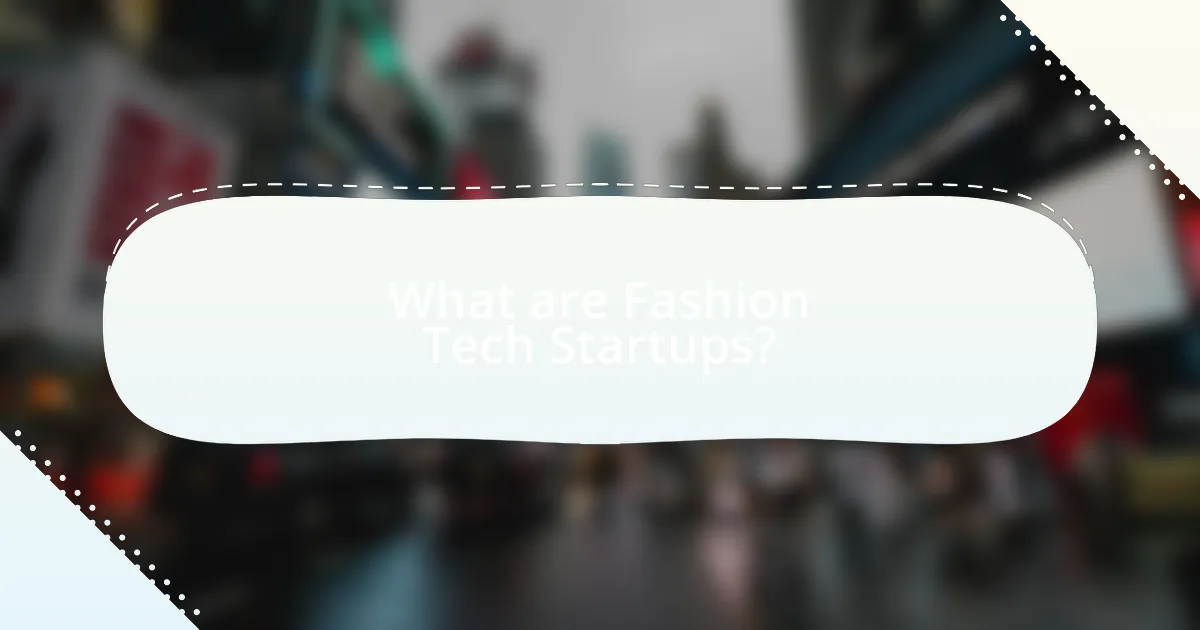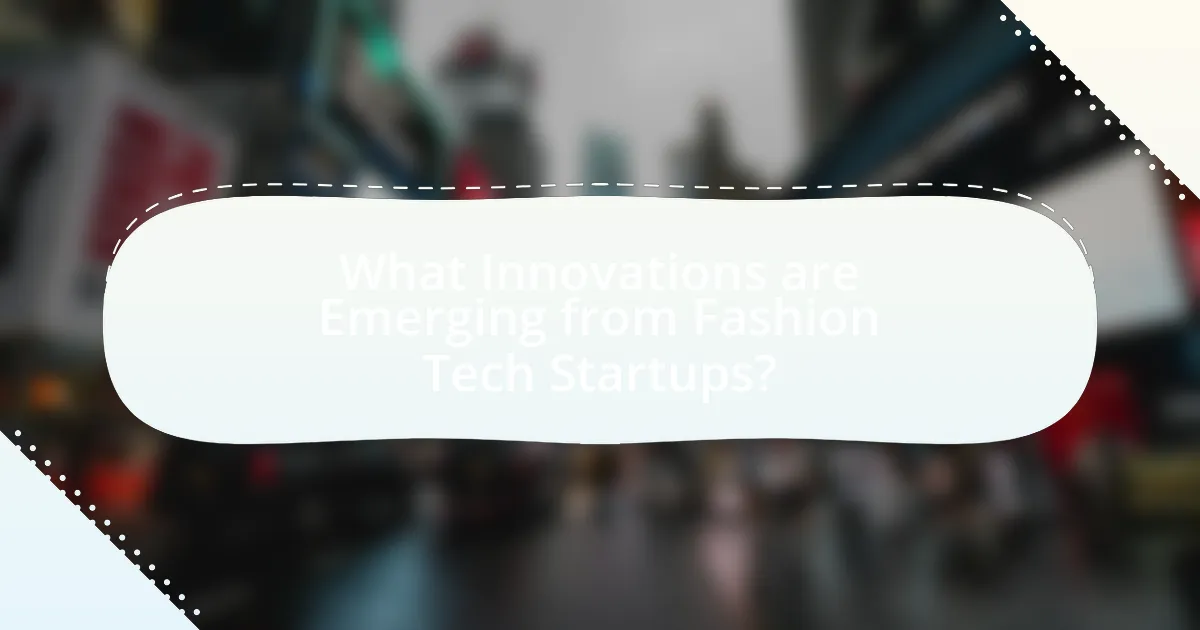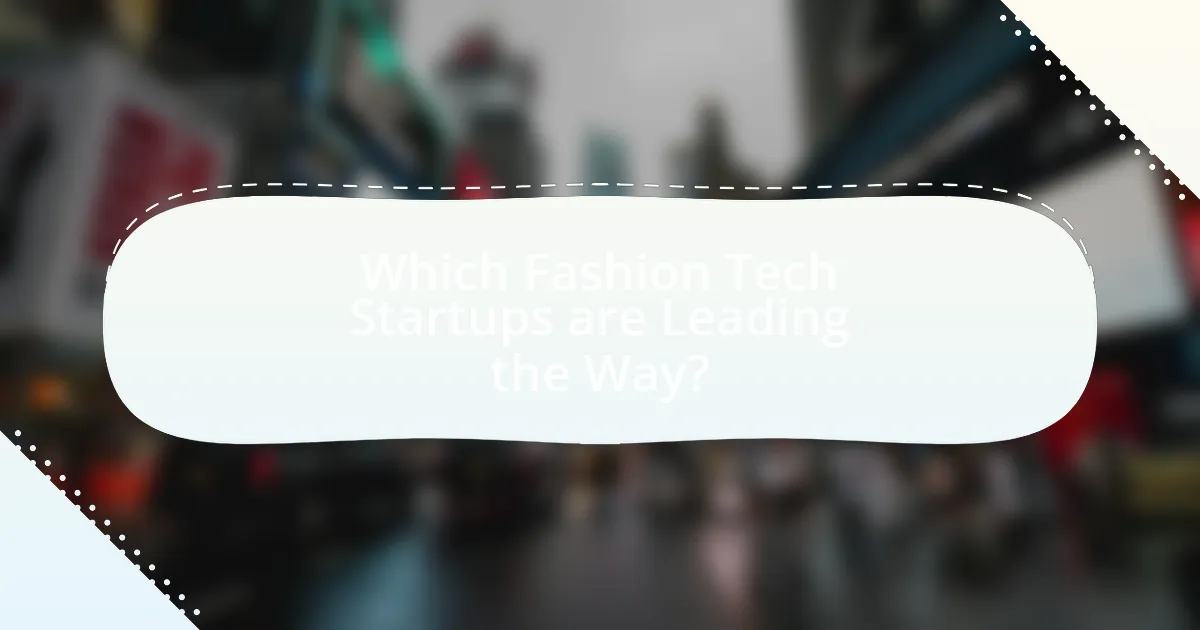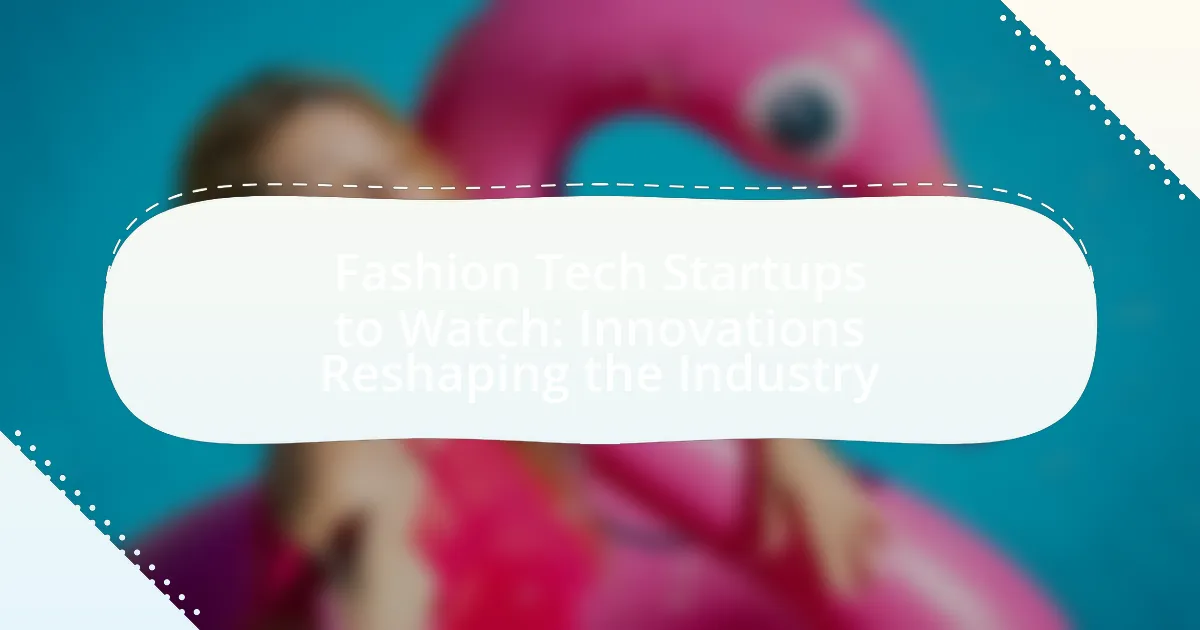Fashion tech startups are companies that merge technology with fashion to innovate products, services, and processes within the industry. This article explores how these startups differ from traditional fashion companies by leveraging advancements such as artificial intelligence, augmented reality, and sustainable materials to enhance customer experiences and operational efficiencies. It highlights the role of fashion tech startups in promoting sustainability, influencing consumer behavior, and shaping market dynamics, while also examining notable startups to watch in 2023 and the challenges they face in a competitive landscape. Additionally, the article discusses the impact of funding trends and regulatory hurdles on their growth, providing insights into best practices for engaging with these innovative companies.

What are Fashion Tech Startups?
Fashion tech startups are companies that integrate technology with fashion to innovate products, services, and processes within the industry. These startups often focus on areas such as e-commerce, wearable technology, sustainable materials, and supply chain optimization. For instance, according to a report by McKinsey & Company, the fashion tech sector is projected to grow significantly, driven by advancements in artificial intelligence and data analytics, which enhance customer experiences and operational efficiencies.
How do Fashion Tech Startups differ from traditional fashion companies?
Fashion tech startups differ from traditional fashion companies primarily in their integration of technology into the design, production, and retail processes. While traditional fashion companies often rely on established supply chains and seasonal collections, fashion tech startups leverage data analytics, artificial intelligence, and e-commerce platforms to create personalized shopping experiences and optimize inventory management. For instance, startups like Stitch Fix utilize algorithms to curate clothing selections tailored to individual customer preferences, a strategy not typically employed by conventional brands. This technological focus allows fashion tech startups to respond more rapidly to market trends and consumer demands, enhancing agility and innovation in the industry.
What technological innovations are commonly utilized by Fashion Tech Startups?
Fashion tech startups commonly utilize innovations such as artificial intelligence (AI), augmented reality (AR), blockchain technology, and 3D printing. AI is employed for personalized shopping experiences and inventory management, with companies like Stitch Fix using algorithms to recommend clothing based on customer preferences. AR enhances virtual fitting rooms, allowing customers to visualize how garments will look on them, as seen in apps like Zara’s AR feature. Blockchain technology is utilized for supply chain transparency and authenticity verification, with brands like Everledger tracking the provenance of luxury goods. Additionally, 3D printing enables rapid prototyping and customization of apparel, exemplified by companies like Unmade, which allows for on-demand production. These technologies collectively drive efficiency, enhance customer engagement, and promote sustainability in the fashion industry.
How do these startups address sustainability in the fashion industry?
These startups address sustainability in the fashion industry by implementing eco-friendly materials, promoting circular fashion, and utilizing technology for efficient production processes. For instance, many startups focus on sourcing organic, recycled, or biodegradable fabrics, which significantly reduce environmental impact compared to conventional materials. Additionally, they often adopt circular economy principles, encouraging recycling and upcycling of garments to minimize waste. Furthermore, advancements in technology, such as AI and blockchain, enable these companies to optimize supply chains, reduce overproduction, and enhance transparency, thereby fostering sustainable practices throughout the industry.
Why are Fashion Tech Startups important for the future of fashion?
Fashion tech startups are crucial for the future of fashion because they drive innovation and sustainability within the industry. These startups leverage technology to create solutions that address pressing issues such as waste reduction, supply chain transparency, and personalized consumer experiences. For instance, according to a report by McKinsey & Company, the integration of technology in fashion can reduce production waste by up to 30% through improved inventory management and on-demand manufacturing. Additionally, fashion tech startups are pioneering advancements in materials, such as biodegradable fabrics and 3D printing, which can significantly lower the environmental impact of clothing production. Thus, their role is essential in shaping a more efficient, sustainable, and consumer-centric fashion landscape.
What role do they play in consumer behavior changes?
Fashion tech startups play a significant role in consumer behavior changes by introducing innovative technologies that enhance the shopping experience and influence purchasing decisions. These startups leverage advancements such as augmented reality, artificial intelligence, and personalized marketing to create more engaging and tailored experiences for consumers. For instance, a study by McKinsey & Company highlights that 75% of consumers are more likely to purchase from brands that offer personalized experiences, demonstrating how technology-driven personalization can shift consumer preferences and behaviors.
How do they influence fashion trends and market dynamics?
Fashion tech startups influence fashion trends and market dynamics by introducing innovative technologies that reshape consumer experiences and production processes. These startups leverage advancements such as artificial intelligence, augmented reality, and sustainable materials to create personalized shopping experiences, optimize supply chains, and reduce environmental impact. For instance, companies like Stitch Fix utilize AI algorithms to provide tailored clothing recommendations, significantly impacting consumer purchasing behavior and driving trends toward personalization. Additionally, startups focusing on sustainable fashion, such as Reformation, have shifted market dynamics by prioritizing eco-friendly practices, influencing larger brands to adopt similar strategies in response to consumer demand for sustainability. This interplay between technology and consumer preferences not only sets new trends but also compels established brands to adapt, thereby transforming the overall fashion landscape.

What Innovations are Emerging from Fashion Tech Startups?
Fashion tech startups are emerging with innovations such as AI-driven design tools, sustainable materials, and virtual fitting technologies. AI-driven design tools enable designers to create collections more efficiently by analyzing trends and consumer preferences, as seen in companies like Stitch Fix. Sustainable materials, including bio-fabricated textiles and recycled fabrics, are being developed to reduce environmental impact, exemplified by brands like Reformation. Virtual fitting technologies, such as augmented reality applications, allow consumers to try on clothes digitally, enhancing the shopping experience and reducing return rates, as demonstrated by startups like Zeekit. These innovations are reshaping the fashion industry by improving efficiency, sustainability, and consumer engagement.
How are wearable technologies transforming the fashion landscape?
Wearable technologies are transforming the fashion landscape by integrating functionality with style, enabling garments to monitor health metrics and enhance user experience. For instance, smartwatches and fitness trackers not only serve as fashion accessories but also provide real-time data on heart rate, activity levels, and sleep patterns, appealing to health-conscious consumers. According to a report by Statista, the global wearable technology market is projected to reach $62 billion by 2025, indicating a significant shift in consumer preferences towards multifunctional apparel. This convergence of technology and fashion is fostering innovation among fashion tech startups, which are increasingly developing smart textiles and connected clothing that adapt to user needs, further reshaping industry standards.
What are the latest advancements in smart textiles?
The latest advancements in smart textiles include the development of fabrics that can monitor health metrics, such as heart rate and temperature, through integrated sensors. For instance, researchers have created textiles embedded with conductive fibers that can transmit data to mobile devices, enabling real-time health monitoring. Additionally, companies are innovating with textiles that can change color or pattern in response to environmental stimuli, enhancing both functionality and aesthetic appeal. These advancements are supported by studies demonstrating the effectiveness of smart textiles in improving user experience and health outcomes, such as a 2023 study published in the Journal of Textile Science, which highlighted the potential of smart fabrics in wearable health technology.
How do wearables enhance user experience in fashion?
Wearables enhance user experience in fashion by integrating technology with clothing and accessories, allowing for personalized interactions and improved functionality. For instance, smartwatches and fitness trackers provide real-time health data, enabling users to monitor their fitness levels while maintaining a stylish appearance. Additionally, smart fabrics can adjust to environmental conditions, offering comfort and convenience. A study by McKinsey & Company highlights that 70% of consumers are interested in wearable technology that enhances their fashion choices, indicating a strong market demand for such innovations.
What impact does artificial intelligence have on fashion tech?
Artificial intelligence significantly enhances fashion tech by optimizing design processes, personalizing customer experiences, and streamlining supply chains. AI algorithms analyze consumer data to predict trends, enabling designers to create products that align with market demands. For instance, companies like Stitch Fix utilize AI to recommend clothing based on individual preferences, resulting in increased customer satisfaction and sales. Additionally, AI-driven tools improve inventory management by forecasting demand, which reduces waste and lowers costs. According to a report by McKinsey, AI could contribute up to $300 billion to the fashion industry by 2030 through these efficiencies.
How is AI being used for personalized shopping experiences?
AI is used for personalized shopping experiences by analyzing consumer data to tailor product recommendations and marketing strategies. For instance, algorithms assess browsing history, purchase patterns, and demographic information to suggest items that align with individual preferences. A study by McKinsey & Company found that personalized recommendations can increase sales by 10 to 30 percent, demonstrating the effectiveness of AI in enhancing customer engagement and satisfaction. Additionally, AI-driven chatbots provide real-time assistance, further personalizing the shopping journey by addressing specific customer inquiries and preferences.
What are the implications of AI-driven design processes?
AI-driven design processes significantly enhance efficiency and creativity in fashion design. These processes enable designers to analyze vast amounts of data, leading to more informed decisions regarding trends, materials, and consumer preferences. For instance, AI algorithms can predict fashion trends by analyzing social media and sales data, allowing brands to respond quickly to market demands. Additionally, AI tools facilitate rapid prototyping and customization, reducing the time from concept to production. According to a report by McKinsey & Company, companies that integrate AI into their design processes can improve productivity by up to 30%. This integration not only streamlines operations but also fosters innovation, as designers can experiment with new ideas without the constraints of traditional methods.

Which Fashion Tech Startups are Leading the Way?
Leading fashion tech startups include Stitch Fix, which utilizes data science for personalized styling, and Rent the Runway, known for its innovative clothing rental model. Additionally, companies like Farfetch leverage technology to connect consumers with luxury fashion brands globally, while Glossier has transformed beauty retail through direct-to-consumer strategies and community engagement. These startups exemplify how technology is reshaping the fashion industry by enhancing customer experience and accessibility.
What are some notable Fashion Tech Startups to watch in 2023?
Notable fashion tech startups to watch in 2023 include Stitch Fix, which utilizes data science to personalize clothing recommendations, and Rent the Runway, known for its innovative rental model that promotes sustainable fashion. Another key player is Allbirds, focusing on eco-friendly materials and sustainable production methods. Additionally, Lyst stands out with its fashion search platform that aggregates products from various retailers, enhancing the shopping experience. These startups exemplify the intersection of technology and fashion, driving significant changes in consumer behavior and industry practices.
What unique solutions do these startups offer to the fashion industry?
Fashion tech startups offer unique solutions such as sustainable materials, AI-driven design, and personalized shopping experiences. For instance, companies like Reformation focus on eco-friendly fabrics and transparent supply chains, reducing environmental impact. Additionally, startups like Stitch Fix utilize AI algorithms to curate personalized clothing selections for customers, enhancing the shopping experience. These innovations not only address consumer demand for sustainability and personalization but also streamline production processes, making the fashion industry more efficient and responsive to market trends.
How have these startups gained traction in a competitive market?
Fashion tech startups have gained traction in a competitive market by leveraging innovative technology, unique value propositions, and targeted marketing strategies. For instance, many of these startups utilize artificial intelligence and data analytics to personalize shopping experiences, which enhances customer engagement and satisfaction. Additionally, collaborations with established brands and influencers have amplified their visibility and credibility, allowing them to reach broader audiences. According to a report by McKinsey & Company, the integration of technology in fashion has led to a 20% increase in customer retention for companies that effectively implement these strategies.
What challenges do Fashion Tech Startups face?
Fashion tech startups face significant challenges including funding, market competition, and technological integration. Securing adequate funding is often difficult, as investors may be hesitant to back new ventures in a rapidly evolving industry. Additionally, competition from established fashion brands and other startups can hinder market entry and growth. Furthermore, integrating advanced technologies, such as AI and blockchain, into existing fashion processes requires substantial expertise and resources, which many startups may lack. These challenges are compounded by the need to stay relevant in a fast-paced market that demands constant innovation and adaptability.
How do funding and investment trends affect their growth?
Funding and investment trends significantly influence the growth of fashion tech startups by providing the necessary capital for innovation and expansion. Increased investment allows these startups to develop new technologies, enhance product offerings, and scale operations. For instance, in 2021, global investment in fashion tech reached approximately $1.5 billion, reflecting a growing interest in sustainable practices and digital solutions, which directly correlates with the rapid growth of startups in this sector. Additionally, access to funding enables startups to attract top talent and invest in marketing strategies, further accelerating their market presence and competitive edge.
What regulatory hurdles must they navigate in the fashion industry?
Fashion tech startups must navigate several regulatory hurdles, including compliance with labor laws, environmental regulations, and intellectual property rights. Labor laws require adherence to fair wage practices and safe working conditions, which can vary significantly by region. Environmental regulations mandate sustainable practices, such as waste management and chemical usage, to minimize ecological impact. Additionally, intellectual property rights protect designs and innovations, necessitating careful navigation of trademark and patent laws to avoid infringement. These regulations are critical for ensuring ethical practices and protecting innovations within the fashion industry.
What are the best practices for engaging with Fashion Tech Startups?
The best practices for engaging with Fashion Tech Startups include fostering collaboration, understanding their unique challenges, and leveraging technology for mutual growth. Collaboration is essential as it allows established brands to share resources and expertise, which can accelerate innovation. Understanding the unique challenges faced by these startups, such as funding limitations and market entry barriers, enables more effective support and partnership strategies. Leveraging technology, such as data analytics and digital marketing tools, can enhance visibility and operational efficiency for both parties. These practices are supported by industry reports indicating that partnerships between established brands and startups can lead to increased market competitiveness and innovation, as seen in successful collaborations like those between major fashion houses and emerging tech firms.
How can consumers support innovative fashion technologies?
Consumers can support innovative fashion technologies by actively purchasing products from fashion tech startups. By choosing to buy from these companies, consumers provide essential revenue that enables further research and development in sustainable materials, smart textiles, and digital fashion solutions. For instance, a report by McKinsey & Company highlights that consumer demand for sustainable fashion has increased, with 67% of consumers stating they consider the use of sustainable materials important when making a purchase. This trend encourages startups to innovate and invest in new technologies that align with consumer values.
What strategies should investors consider when evaluating Fashion Tech Startups?
Investors should consider a multi-faceted approach when evaluating Fashion Tech Startups, focusing on market potential, technological innovation, and team expertise. Market potential can be assessed by analyzing industry trends, such as the growth of e-commerce in fashion, which is projected to reach $1 trillion by 2025 according to Statista. Technological innovation is crucial; startups that leverage AI for personalized shopping experiences or blockchain for supply chain transparency are more likely to succeed. Team expertise is another critical factor; a strong founding team with a background in both fashion and technology can significantly enhance a startup’s chances of success. These strategies provide a comprehensive framework for investors to make informed decisions in the rapidly evolving Fashion Tech landscape.

Leave a Reply